
Lea Salonga On Representation, Set List Curation, And Our Vibrant Local Theater Scene
“The minute I am in front of an audience, I know that there are going to be other Filipinos in that audience also. I want them to be able to leave feeling able to put their heads high that someone from home is doing good work, and hopefully making them proud.”
Lea Salonga needs no introduction. Theater fans all over the world know her as Kim, Eponine, Fantine, Mulan, and Jasmine. In her almost five decades in the industry, Lea has won Tony and Laurence Olivier awards, become a Disney Princess, performed all around the globe, and inspired so many young Filipinos and Asians along the way.
The Filipino icon is certainly not slowing down, though. She recently starred in Stephen Sondheim’s Old Friends and Request Sa Radyo, and is set to bring her Stage, Screen & Everything in Between to Manila later this year. Below, TheaterFansManila.com talks to Lea about her almost five decade-long career, representation in the international theater scene, and the set list for her upcoming concert.
The local theater scene
“I don’t think I ever foresaw at any point in my career, either as a child or as a young adult, that there would be this many shows running at the same time,” Lea shares when asked about the biggest change she’s seen in the local theater industry. She mentions that as a kid, she had limited knowledge of production companies, but now alongside Repertory Philippines and PETA there are diverse shows from the likes of Full House Theater Company, The Sandbox Collective, and 9 Works Theatrical.
“I don’t think that I could have ever foreseen how active and vibrant the scene seems to be. It’s fun! It means that there are actors who are working, which makes me very happy. It means my friends are working. It means they are creating or being part of something where they can be artists, and be able to do what it is that they were put on this earth to do. It makes me feel incredibly happy and grateful that there are audiences that are going to the theaters and supporting all of these efforts, and, yeah, whether it’s a straight play, a musical or in our case in Request Sa Radyo, a wordless play, which is like art installation-cum-theater. It’s great that there seems to be interest and this desire and this drive to go and see something. It’s something that I never thought I’d ever see in my lifetime.”
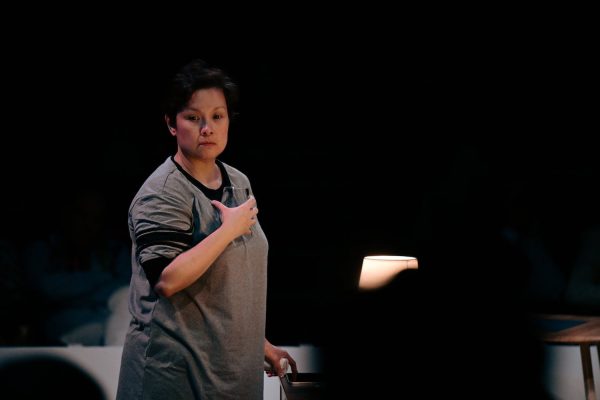
Lea Salonga; Photo Credit: Sandro Paredes/ Request sa Radyo
She highlights that people going to the theater and shows getting sold out means companies get encouraged to produce more quality shows like Rak Of Aegis (which she saw three times!) and Ang Huling El Bimbo. For Lea, it’s impressive how these shows repurposed familiar music into narratives she never expected—while also adding social commentary on Philippine society.
Representation on Broadway and the West End
Another huge change for Lea, this time on the US and UK stage, is more inclusivity. “What I am enjoying seeing is that there are more stories where people of color are really being thrust into the leads,” Lea says as she gushes over seeing Filipina-American Nicole Scherzinger as Sunset Boulevard’s Norma Desmond while she was living in London, being absolutely thrilled that Nicole is also making her Broadway debut.
“It’s great that there are stories that are much more inclusive and that there are more people of color that are doing what it is we are doing,” Lea tells TFM. “Of course, there could always be more. I would like the progression to be that it’s more stories written by people of color about the experiences of people of color—that’s what I would love to see more of. Shows where it’s not just people of color being shoehorned into roles that were originally written for Caucasian actors, or that’s a white people’s history just using melaninated bodies.”
Lea jokes that aside from her waistline, there isn’t really much from the past that she misses partly because she is booking more projects now that she’s older. She adds, “Back in the day, like in Les Misérables, I would usually be the only Asian in a company of actors who are mostly white. I don’t miss that.” Lea’s second stint in Les Misérables, where she played Fantine instead of Eponine, had noticeably more people of color in the cast, which she loved. “The ensemble was like the ‘United Colors of Les Misérables’, is what I would call it in my head. It just felt wonderful being a part of this company and a part of this storytelling where…anybody could populate any of those roles if you had the vocal ability to do it and it was incredible being a part of that. And it did prove a huge point.”
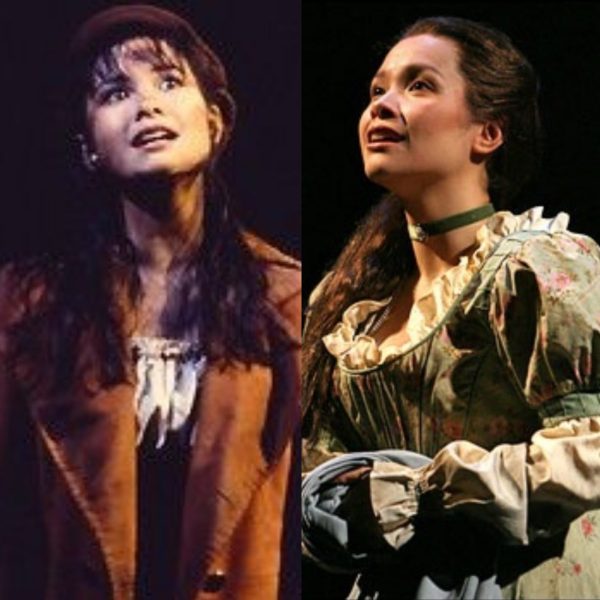
L-R: Lea Salonga as Eponine and Lea Salonga as Fantine in Les Misérables; Photos by Joan Marcus
Stage, screen, and everything in between: the set list
The Lea Salonga: Stage, Screen & Everything in Between concert will be staged at The Theatre at Solaire next month and will include numbers from beloved musicals like Miss Saigon and Les Miserables, as well as from the West End tribute revue Stephen Sondheim’s Old Friends (which she starred in with Bernadette Peters).
Sondheim material, the Tony winner shares, can be “intimidating, overwhelming, daunting, difficult, and challenging” to someone who suddenly has to learn the music, including her. Lea tried to learn Sweeney Todd by ear through cast recordings and albums, but eventually decided to go by the sheet music and infuse it with what she knew of the character. For Lea, Sondheim music is hard in the beginning, but “once you learn it, it’ll never leave you”.
One Sweeney Todd song in particular, “Worst Pies In London”, would give her a lot of anxiety every time she had to perform it. “It was just the most challenging thing, because of the speed, because of the busyness of this character, and I’m trying to embody Mrs. Lovett as much as possible. And it also didn’t help that I was singing that song and that whole Sweeney Todd section in front of a bunch of people from London, and I had to put on a Cockney accent. It was a lot, but it felt incredibly fulfilling that I got to do it.”
“Doing it in Manila is one thing, because I can kind of get away with an imperfect accent. I mean, it was good enough, but not everyone in Manila can tell if say one word goes awry. But it was the UK, and I knew that I could not—In my head anyway—I could not afford to mess up. And I didn’t want to, out of respect for the piece and out of respect for the people that would be watching it. I wanted to get it as right as I absolutely could.” Thankfully, Lea was able to get the best advice from the likes of Sally Ann Triplett and Julia McKenzie, who had played Mrs. Lovett in the past.
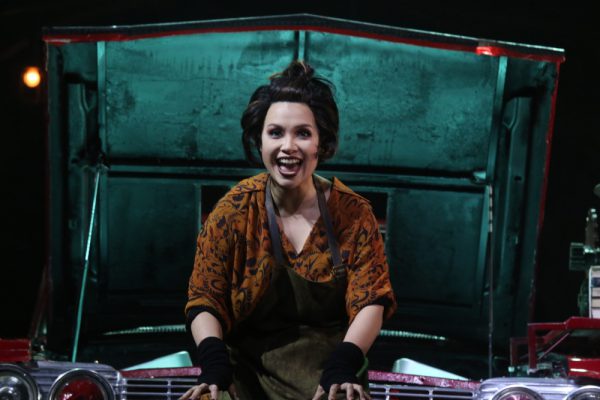
Lea Salonga as Mrs. Lovett | Photo Credit: Atlantis Theatrical Entertainment Group
Together with her brother Gerard Salonga (the show’s musical director) and her manager Josh Pultz, Lea would continuously curate the set list for Stage, Screen & Everything in Between even during the show’s UK tour dates. The goal was to make the show feel like a cohesive, organic thread, with one (secret) song in particular she can’t wait for audiences to hear!
The concert will also feature songs from Disney’s Mulan and Aladdin, movies which cemented Lea’s place as a Disney Princess. She fondly recalls recording Aladdin as Princess Jasmine just before her 21st birthday, which was the “perfect gift”. And when it comes to Mulan, “Reflection” has a special place in her heart and has taken on a bigger meaning after all these years:
“I know what that song meant to me as a young Asian actor-singer trying to navigate this industry that wasn’t always friendly to people of color. I would find I felt represented by that animated character that was onscreen, and because of all of the wonderful things that this character was doing in the film, I was like, well, if she could do it, then maybe I can also do something wonderful. Now, I am an actual person that has done some pretty amazing things over the course of my career, whether amazing in the sense of getting to work with some fabulous people, or getting to be able to perform in some amazing venues, and being able to maintain a career that’s a few years shy of five decades long, which is something that not a lot of people can say.”
“So now it’s like if there is a little girl who dreams of a life or a career like this, when I sing that song now, and there’s a young person that happens to be watching this as I sing this song. It kind of is a pay it forward, passing on a baton moment where you are now seeing an actual person sing the song. It’s not a cartoon character anymore. And if I can make this happen for myself, then perhaps so can you. So that is what that song represents now for me, it’s the passing along of a wish, of a dream, of an aspiration for another young person that sees me singing this song, and thinks, ‘If she’s able to do it, maybe I can.’”
Lea elaborates that despite it being the 2020s, unfortunately there’s still pushback when people of color are cast in lead roles—particularly Halle Bailey in the live-action reimagining of The Little Mermaid. “If she was honestly the best person that showed up at that audition, then she should get it. And that’s the dream: that somebody walks in, opens their mouth, and everybody’s just like, that’s her, you know? And she was a mermaid, for crying out loud!”
“The original is never going to go away. The original is always there. If you want to watch the original, watch the original. But this is something important for all these little girls, who will now feel like they do have a place and they have somebody to really look up to. It’s not just Tiana [from The Princess and the Frog]. It can now also be live-action Ariel. And if she honestly was the best person for the job, then good luck to her. Oh my god, her voice, just beautiful. And I was listening for that ping, because every Disney princess that sings has like this quality, and she had it. Yep, right person for the job.”
Life lessons from a mentor
Lea considers her “Tita Bibot”, Repertory Philippines’ Zenaida Amador, as one of her theater mentors and recalls sitting on the floor with other kids at rehearsal, listening to Amador deliver speeches full of wisdom. There are three important pieces of advice Lea will always attribute to her. First is discipline—“It was making sure that you had yourself together, you had your stuff together, and that you came to every rehearsal prepared and on time…It meant practice, it meant preparation, it meant punctuality, it meant professionalism.”
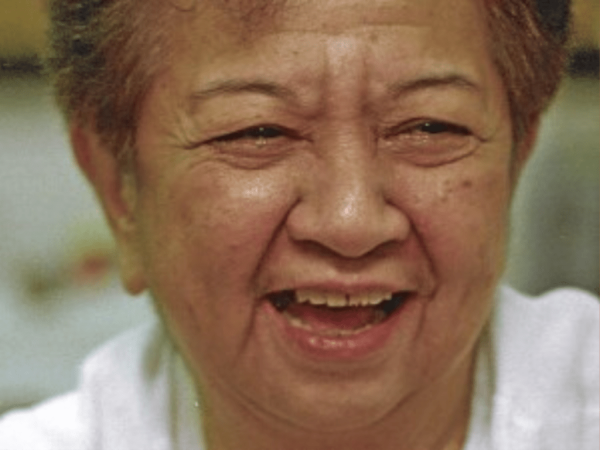
Zenaida “Bibot” Amador, Co-founder of Repertory Philippines
Next is that when performing, one should always come from a place of honesty and truth. “There are people who say that actors are the best liars, because we tend to say things that are, in life, not the truth. That’s something I kind of don’t agree with. Because when you’re on stage and you are playing a character, you have to play that character with honesty. You have to play that character as if the words in that script are God’s absolute truth.” Lea mentions her recent show Request Sa Radyo, which centers on an OFW healthcare worker, as an example—how even though the source material was written in the 1970s and viewers have never been OFWs, there are universal truths from it that still resonate with audiences.
“So when I would like to think in my own interpretation, when Tita Bibot said ‘truth’, you have to be truthful, you have to be honest, that there are fundamental truths in the lines of these people or in the storylines that we get to portray on stage, truths that people in the audience are able to easily recognize and relate to. So we cannot be dishonest in our portrayals of these characters. Yes, they’re characters, but we still have to hit upon something that is honest. It has to come from a place of honesty, and it has to come from truth.”
Lastly, Lea emphasizes that theater is a collaborative, collective experience and teamwork really does make the dream work. It’s important to always treat everyone with kindness and dignity. “Even if there’s only one person on stage, there’s a whole village that is making this show possible. The director, designers, producers, stage managers, lights and sound operators, the ushers, custodial staff, our production manager…No one can ever take solo credit for anything—not for the careers we have, not for the shows we put on. So many people have their responsibilities in making a show work.”
A Filipina theater icon
Representing the Philippines on the global stage, especially when she started in the industry at such a young age, must come with a lot of pressure. Lea acknowledges that she feels a sense of responsibility, saying, “I am very aware, astutely aware, of how people see me, of how people consider me to be representing a people, an entire country of people. I feel the responsibility to have my best foot forward as somebody in this industry. So for me, it’s about being someone that’s nice to work with, that’s fun to work with, that’s very collaborative, and someone who shows up prepared. Because I know that when there’s another Filipino actor that comes along and wants to be a part of this, I feel like, maybe, I’ve laid a little bit of groundwork to make it a little easier for the next person to come. So when they see that I’m Filipino, that immediately means something positive, and then they make it easier for the next generation that comes after them.”
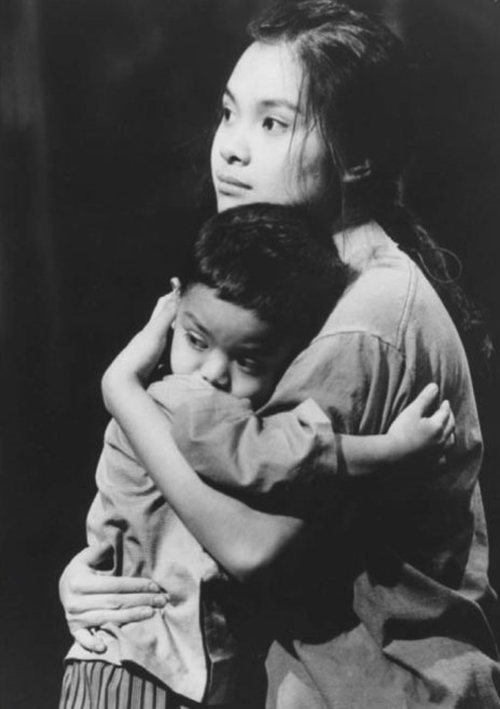
Lea Salonga as the original Kim in Miss Saigon; Photo Credit: Joan Marcus
However, when she’s in “actor mode” and preparing for a performance, Lea becomes more of an individual as she tries to figure stuff out artistically and creatively (like when she’s navigating her way though a song and memorizing blocking). “Once I’m in front of many, many people, then that awareness comes back…I try to put on as excellent a show as I absolutely can on the day, whatever excellent means on that particular day. So that when there are Filipinos in the audience and they look up at me, and they’re seeing me, and they see what I’m doing, they see the example I’m trying to set, that when they leave the theater, they feel proud that there’s somebody who is doing her best and representing all of us.”
Lea ends with this: “The minute I am in front of an audience, I know that there are going to be other Filipinos in that audience also. I want them to be able to leave feeling able to put their heads high that someone from home is doing good work, and hopefully making them proud.”
*Answers have been edited for clarity.


Comments